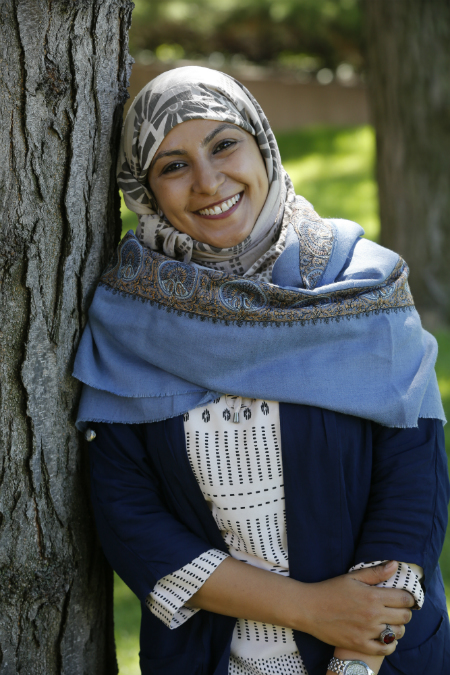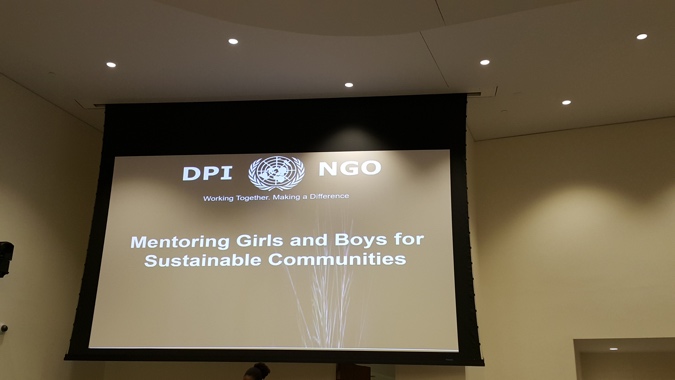Submitted by Fadia on
 On March 24, 2016, I was one of 20 Hubert H. Humphrey Fellows from University of Minnesota Law School and American University Washington College of Law who visited the United Nations headquarters to attend the 60th session of the Commission on the Status of Women (CSW60). During my visit I had the opportunity to attend many sessions, such as Mentoring Girls and Boys for Sustainable Communities presented by the Department of Public Information Non-Governmental Organizations. During the session, six remarkable women represented civil society and different organizations that work with girls and boys. Each shared her experiences to empower boys and girls during her personal or professional journey.
On March 24, 2016, I was one of 20 Hubert H. Humphrey Fellows from University of Minnesota Law School and American University Washington College of Law who visited the United Nations headquarters to attend the 60th session of the Commission on the Status of Women (CSW60). During my visit I had the opportunity to attend many sessions, such as Mentoring Girls and Boys for Sustainable Communities presented by the Department of Public Information Non-Governmental Organizations. During the session, six remarkable women represented civil society and different organizations that work with girls and boys. Each shared her experiences to empower boys and girls during her personal or professional journey.
From my point of view and observations from this session, sustainability is one of the greatest challenges of our time. This requires unprecedented collaboration among municipal governments, civil society, community and business groups, and other organizations in order to create the kind of future we want for ourselves, our society, and for future generations. Engaging and working with boys and girls through mentors from very young ages is a very important tool. Mentors help to build skills children can learn and develop which help them to foster sustainability for their generation and future.
Achieving sustainability, especially in the context of war and conflict over the past six years, is one of the biggest challenges we are facing in Middle East societies. Facing such hard circumstances where our children live in countries like Yemen, Syria, Libya, Palestine, Iraq and the list goes on. Children in these countries are suffering from the lack of fundamental and basic life elements. I’m not talking about food, water and shelter. I’m talking about safe neighbors – a safe environment – where children can play with others, a place where children have the right to enjoy their childhood and innocence.

Sustainability is a word with multiple meanings. It means to not be afraid to show your identity, religion, ethnicity, or more generally, who you are. It means to have community support – people such as your family, friends, your mentor and the community who support you and guide you. It’s a collaborative process to move from planning to implementation by setting and implementing objectives.
During the session one of the organizations, One Hundred Black Men, presented a holistic mentoring model. They address all life aspects when working with girls and boys: moral character, physical health and emotional skills, academics, work ethic, technical and life skills, and social media. Mentors are helping girls to dream big. Not only can they dream to be a hair stylist but surgeons and engineers. Mentors influence girls and boys and have a huge impact in shaping their life to expand and reach their own vision.
In my own experience, I have been fortunate to have different mentor who have supported me in every stage in my life. I remember my first mentor who I met in my senior year in university. I volunteered to work as a computer engineer in one of the international organizations working in Yemen. She showed up with the perfect timing, when I needed guidance about shaping my future and professional career. She impacted my life significantly by building my capacity to understand and engage in humanitarian work.
Since then, I’m a woman, computer engineer and I’m a humanitarian worker dedicated to working in conflict zones. I'll continue to work in this field wherever it takes me, anywhere in world.
I've realized if one day I'll able to make difference in the life of one child, it’s enough for me to guide her or him to be who they really dream to be.


